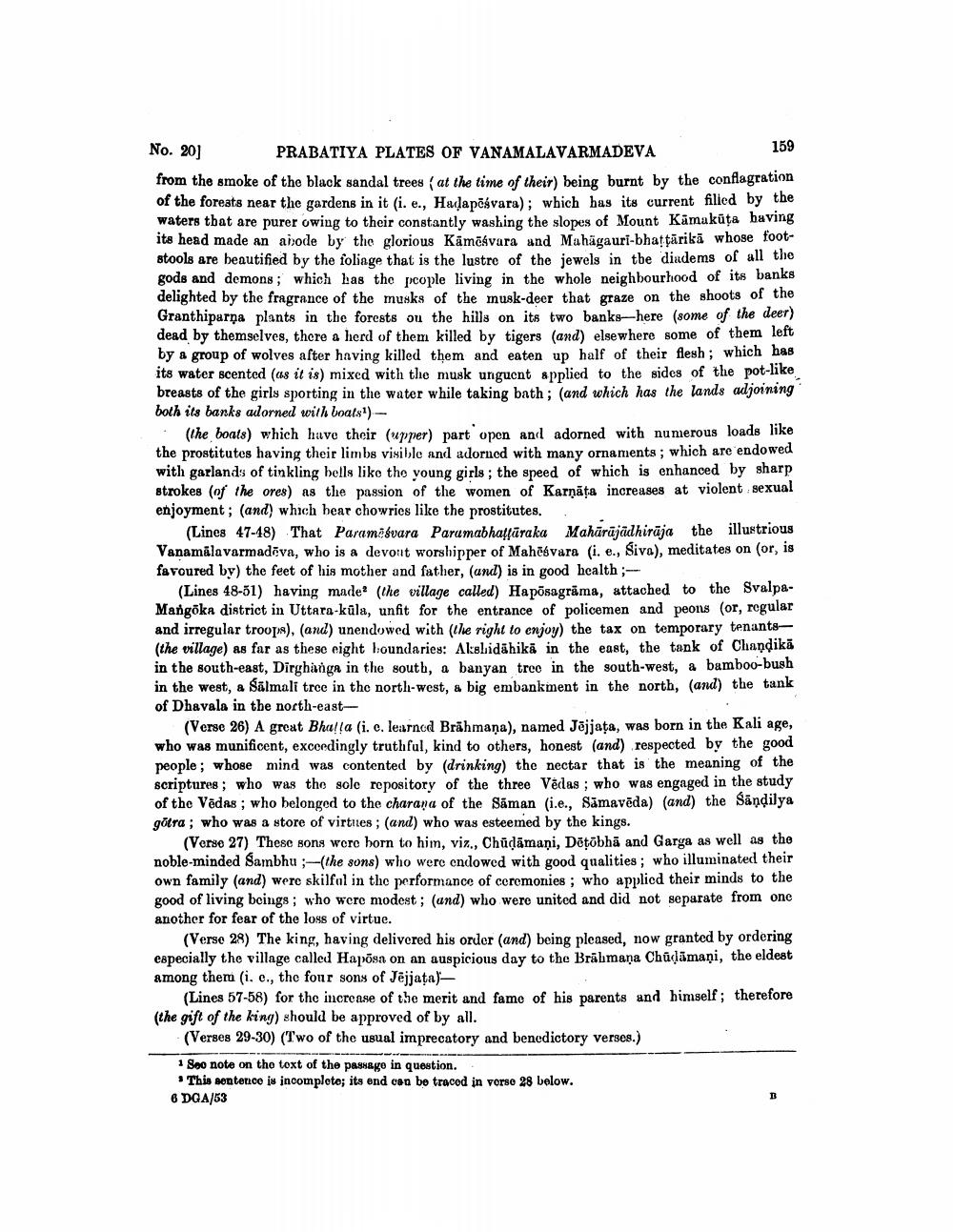________________
No. 20) PRABATIYA PLATES OF VANAMALAVARMADEVA
159 from the smoke of the black sandal trees ( at the time of their) being burnt by the conflagration of the forests near the gardens in it (i. e., Hadapēsvara); which has its current filled by the waters that are purer owing to their constantly washing the slopes of Mount Kamakūta baving its head made an anode by the glorious Kamēsvara and Mahägauri-bhattārikā whose footstools are beautified by the foliage that is the lustre of the jewels in the diadems of all the gods and demons; which has the people living in the whole neighbourhood of its banks delighted by the fragrance of the musks of the musk-deer that graze on the shoots of the Granthipar a plants in the forests on the hills on its two banks-here (some of the deer) dead by themselves, there a herd of them killed by tigers (and) elsewhere some of them left by a group of wolves after having killed them and eaten up half of their flesh; which has its water scented (as it is) mixed with the musk unguent applied to the sides of the pot-like breasts of the girls sporting in the water while taking bath ; (and which has the lands adjoining both its banks adorned with boats)
(the boats) which have their (wpper) part open and adorned with numerous loads like the prostitutes having their limbs visible and adorned with many ornaments; which are endowed with garlands of tinkling bells like the young girls; the speed of which is enhanced by sharp strokes (of the ores) as the passion of the women of Karnāta increases at violent sexual enjoyment; (and) which hear chowries like the prostitutes. . .
(Lines 47-48) That Paramosvara Parumabhattūraka Mahārājādhirūja the illustrious Vanamálavarmadēva, who is a devont worshipper of Mahabvara (i. e., Siva), meditates on (or, is favoured by) the feet of his mother and father, (and) is in good health :
(Lines 48-51) having made? (the village called) Hapõsagrāma, attached to the SvalpaMangőka district in Uttara-küla, unfit for the entrance of policemen and peons (or, regular and irregular troop), (and) unendowed with the right to enjoy) the tax on temporary tenants(the village) as far as these cight boundaries: Akelidāhikä in the east, the tank of Chandikā in the south-east, Dirghänga in the south, a banyan tree in the south-west, a bamboo-bush in the west, a Sālmali tree in the north-west, a big embankment in the north, (and) the tank of Dhavala in the north-east
(Verse 26) A great Bhalla (i. o. learnod Brahmana), named Jöjjata, was born in the Kali age, who was munificent, exceedingly truthful, kind to others, honest (and) respected by the good people; whose mind was contented by (drinking) the nectar that is the meaning of the scriptures; who was the sole repository of the three Vēdas ; who was engaged in the study of the Vēdas ; who belonged to the charana of the Saman (i.e., Sämavēda) (and) the Sändilya götra ; who was a store of virtues; (and) who was esteemed by the kings.
(Verse 27) Thesc sons were born to him, viz., Chūdāmani, Dötöbhā and Garya as well as the noble-minded Sambhu :-(the sons) who were endowed with good qualities; who illuminated their own family (and) were skilful in the performance of ceremonies; who applied their minds to the good of living beings; who were modest; (and) who were united and did not separate from one another for fear of the loss of virtue.
(Verse 28) The king, having delivered his order (and) being pleased, now granted by ordering especially the village called Haposn on an auspicious day to the Brābmana Chūdāmaņi, the eldest among them i. c., the four sons of Jējjata) -
(Lines 57-58) for the increase of the merit and fame of his parents and himself; therefore (the gift of the king) should be approved of by all.
(Verses 29-30) (Two of the usual imprecatory and benodictory verses.)
1 Soo note on tho toxt of the passage in question..
This sentence is incompleto; its and can be traced in vorso 28 below. 6 DGA/53




